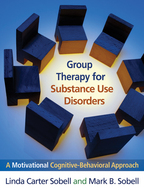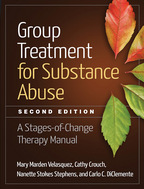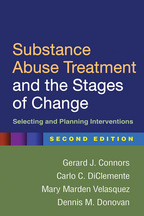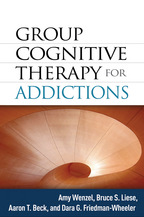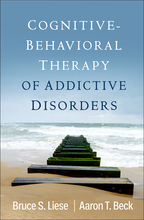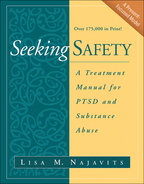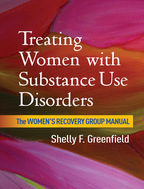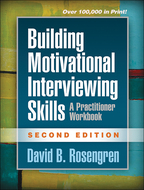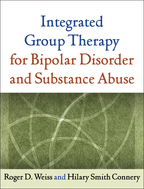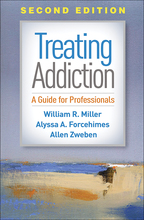Group Therapy for Substance Use Disorders
A Motivational Cognitive-Behavioral Approach
Linda Carter Sobell and Mark B. Sobell
A Paperback Originale-bookprint + e-book
A Paperback Original
orderJanuary 20, 2011
ISBN 9781609180515
Price: $49.00 236 Pages
Size: 8" x 10½"
Sign up for emails on upcoming titles on Addictions (with special discounts)!
“This book gives details of the guided self-change (GSC) model. The model has been proven by the authors in clinical application....It is clear throughout that the book has been written by skilled and experienced practitioners, with clients' needs at the forefront....The book will appeal to practitioners at all levels who are looking to help the change process in a range of settings.”

—Drugs and Alcohol Today
“Adds much to the field of substance abuse and evidence-based group work....A vibrant and useful text that effectively blends the philosophy of MI with practical examples on how to build a working group based on its principals. Richly peppered with tables and handouts....The book's primer on MI may be useful in many areas of mental health treatment....The authors' ability to blend helpful practice illustrations and principles makes this a text that provides a thoughtful and conceptually based roadmap for group work with the substance-abusing population. The authors' nonjudgmental approach to change makes what they present useful in a variety of group settings beyond those focused on substance abuse....Practitioners working with myriad substance-abusing populations will benefit from this workbook....Although this text seems geared toward adult clients, it can easily be modified for work with adolescents and young adults....With its attention to detail, useful clinical examples and handouts and strong foundation in theory, Group Therapy for Substance Use Disorders: A Motivational Cognitive Behavioral Approach delivers an introduction on addictions, MI and group work for students and beginning practitioners, as well as a useful manual for practiced therapists looking for an organized "how-to" for integrating a new model of change.”

—Social Work with Groups
“A useful guide to group therapy and offers constructive ideas about individual therapy as well. The inclusion of many assessment measures, handouts, informational sheets, and homework assignments makes this a useful reference for therapists who are involved in treating substance use disorders.”

—PsycCRITIQUES
“Comprehensive and up to date, this book presents essential tools for addressing one of the most prevalent and disabling mental health problems. While a group treatment format has advantages over individual treatment, it is also associated with a number of clinical challenges. These challenges are clearly and effectively addressed by the authors. This invaluable resource is destined to become required reading for mental health care providers who want to further develop their clinical skills.”

—Stefan G. Hofmann, PhD, Department of Psychology, Boston University
“The Sobells are preeminent in the addiction treatment field. This engaging book presents the evidence behind their innovative group treatment approach and synthesizes decades of research and clinical experience. Readers will find a wealth of clinical examples, practical advice, handouts, and tools to measure client progress. The Sobells show how leading a group is like conducting an orchestra, and provide wise insights into 'making the music come from the group.'”

—Mary Marden Velasquez, PhD, Director, Health Behavior Research and Training Institute, University of Texas at Austin
“Group therapy is a standard treatment for substance use disorders, but there is limited guidance for group therapists committed to providing empirically supported treatments. The Sobells fill that gap with this book, which provides a beautiful blend of science and clinical wisdom; great handouts for clients; clear instructions for therapists; and meaningful clinical examples. The authors share their experience and thoughts in a way that invites both therapists-in-training and experienced therapists to use their approach. This book is a gem.”

—Barbara S. McCrady, PhD, Distinguished Professor of Psychology and Director, Center on Alcoholism, Substance Abuse, and Addictions, University of New Mexico
—Drugs and Alcohol Today
“Adds much to the field of substance abuse and evidence-based group work....A vibrant and useful text that effectively blends the philosophy of MI with practical examples on how to build a working group based on its principals. Richly peppered with tables and handouts....The book's primer on MI may be useful in many areas of mental health treatment....The authors' ability to blend helpful practice illustrations and principles makes this a text that provides a thoughtful and conceptually based roadmap for group work with the substance-abusing population. The authors' nonjudgmental approach to change makes what they present useful in a variety of group settings beyond those focused on substance abuse....Practitioners working with myriad substance-abusing populations will benefit from this workbook....Although this text seems geared toward adult clients, it can easily be modified for work with adolescents and young adults....With its attention to detail, useful clinical examples and handouts and strong foundation in theory, Group Therapy for Substance Use Disorders: A Motivational Cognitive Behavioral Approach delivers an introduction on addictions, MI and group work for students and beginning practitioners, as well as a useful manual for practiced therapists looking for an organized "how-to" for integrating a new model of change.”
—Social Work with Groups
“A useful guide to group therapy and offers constructive ideas about individual therapy as well. The inclusion of many assessment measures, handouts, informational sheets, and homework assignments makes this a useful reference for therapists who are involved in treating substance use disorders.”
—PsycCRITIQUES
“Comprehensive and up to date, this book presents essential tools for addressing one of the most prevalent and disabling mental health problems. While a group treatment format has advantages over individual treatment, it is also associated with a number of clinical challenges. These challenges are clearly and effectively addressed by the authors. This invaluable resource is destined to become required reading for mental health care providers who want to further develop their clinical skills.”
—Stefan G. Hofmann, PhD, Department of Psychology, Boston University
“The Sobells are preeminent in the addiction treatment field. This engaging book presents the evidence behind their innovative group treatment approach and synthesizes decades of research and clinical experience. Readers will find a wealth of clinical examples, practical advice, handouts, and tools to measure client progress. The Sobells show how leading a group is like conducting an orchestra, and provide wise insights into 'making the music come from the group.'”
—Mary Marden Velasquez, PhD, Director, Health Behavior Research and Training Institute, University of Texas at Austin
“Group therapy is a standard treatment for substance use disorders, but there is limited guidance for group therapists committed to providing empirically supported treatments. The Sobells fill that gap with this book, which provides a beautiful blend of science and clinical wisdom; great handouts for clients; clear instructions for therapists; and meaningful clinical examples. The authors share their experience and thoughts in a way that invites both therapists-in-training and experienced therapists to use their approach. This book is a gem.”
—Barbara S. McCrady, PhD, Distinguished Professor of Psychology and Director, Center on Alcoholism, Substance Abuse, and Addictions, University of New Mexico

